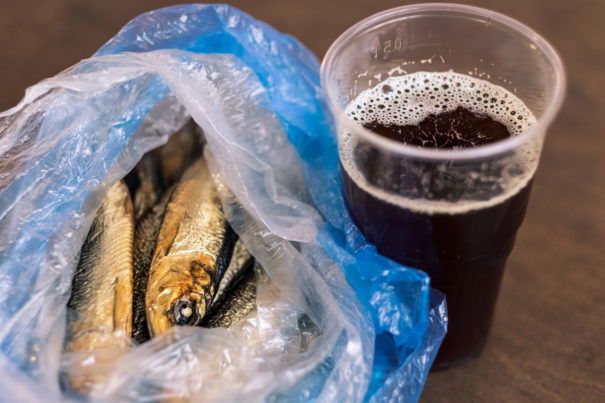
Nothing Like a Little Unmediated Animal Flesh to Send You Running for the Fruit Pavilion

Nothing Like a Little Unmediated Animal Flesh to Send You Running for the Fruit Pavilion
Kvass in Riga
Step this way, into the Fish Pavilion at the Riga Central Market in Latvia, where the stench of fish oil and smoked flesh fills the room to its vaulted ceilings and immediately manifests as a metallic tang in the back of my throat. Vendors in rubber aprons smack around live carp, which smack back, gills heaving. I watch a bucket kick itself across the tile and catch a glimpse of wet black fin inside. And here’s a semicircle of severed pike heads, apparently decorative, vaguely conspiratorial.
If you’re someone like me, this is a strange place for an afternoon snack. But I’m here to sample two Latvian institutions under the roof of a third: smoked sprats and kvass, a sweet near-beer, all washed down under the roof of one of Europe’s largest bazaars.
Kvass seems to have its roots in Russia, though good luck selling that to a Latvian—they’ll say it’s a Baltic thing, or an Eastern European thing, and while we’re at it, the Russians didn’t invent pickles, either. Like prison wine, kvass is easily brewed at home: combine rye bread, sugar, and brewer’s yeast, and let ferment for a few days. The result is a sweet, mildly yeasty beverage that couldn’t get a toddler drunk. In the summer, Latvians sell it from drums by the roadside.
A half-liter pour costs 80 euro-cents (or 90 American cents) at the fish pavilion. There’s space nearby to stand and use it to wash down my plastic-bagged kilogram (2.2 pounds) of smoked sardines. It’s a little sticky on the lips, but not syrupy, with a pleasant fizz that almost makes me forget that this could have been brewed under someone’s bed.
Like kvass, smoked fish is a pillar of the Latvian diet. Much of the fish Latvians eat is caught, processed, and sold in Latvia. Plants line the coast, and Latvian expats will cut off a finger for a tin of Rigas Gold, a particularly famous brand of smoked sprats (small herring) preserved in vegetable oil.
I pinch apart the sprat’s gold foil skin to get to the dark, greasy flecks of meat inside. It’s pungent, salty, and meager. Like steamed crabs, this is a deliberately difficult meal, meant to be enjoyed slowly over conversation. It counters the lingering sweetness of the kvass, and I can briefly imagine having one more.
Far from the poise and polish of Riga’s old city, the market feels unvarnished, post-Soviet. Wide-eyed American tourists expecting a wholesome farmer’s market should prepare instead for Russians in tracksuits to flick cigarette ash on them. Inside the pavilion is a picture of abundance, even if it looks like a grindhouse flick: see the trays of jello-like livers, or the basketball-sized cow’s heart, or the various animal appendages impaled on meat hooks.
I’m an enthusiastic carnivore, but like most Americans, I’m used to a little mass-market mediation between me and my animal flesh. Seeing it—smelling it—makes me want to move on to the fruit pavilion. I manage one sprat, but I can’t do two, forget the full kilo.
I bring the bag to a Latvian friend and ask him if he likes sprats. He gives me a look I’m now familiar with.
“Of course,” he says.